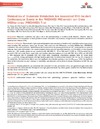Please use this identifier to cite or link to this item:
https://accedacris.ulpgc.es/handle/10553/42449
| Title: | Metabolites of glutamate metabolism are associated with incident cardiovascular events in the PREDIMED PREvención con DIeta MEDiterránea (PREDIMED) Trial | Authors: | Zheng, Yan Hu, Frank B. Ruiz-Canela, Miguel Clish, Clary B. Dennis, Courtney Salas-Salvado, Jordi Hruby, Adela Liang, Liming Toledo, Estefania Corella, Dolores Ros, Emilio Fitó, Montserrat Gómez-Gracia, Enrique Arós, Fernando Fiol, Miquel Lapetra, José Serra Majem, Luis Estruch, Ramón Martínez-González, Miguel A. |
UNESCO Clasification: | 3206 Ciencias de la nutrición | Keywords: | Cardiovascular disease Diet Dietary clinical trial Epidemiology Glutamate, et al |
Issue Date: | 2016 | Journal: | Journal of the American Heart Association | Abstract: | Background: Glutamate metabolism may play a role in the pathophysiology of cardiometabolic disorders. However, there is limited evidence of an association between glutamate-related metabolites and, moreover, changes in these metabolites, and risk of cardiovascular disease (CVD). Methods and Results: Plasma levels of glutamate and glutamine were measured at baseline and 1-year follow-up in a case-cohort study including 980 participants (mean age 68 years; 46% male) from the PREvención con DIeta MEDiterránea (PREDIMED) randomized trial, which assessed a Mediterranean diet intervention in the primary prevention of CVD. During median 4.8 years of follow-up, there were 229 incident CVD events (nonfatal stroke, nonfatal myocardial infarction, or CVD death). In fully adjusted models, per 1-SD, baseline glutamate was associated with 43% (95% CI: 16% to 76%) and 81% (39% to 137%) increased risk of composite CVD and stroke alone, respectively, and baseline glutamine-to-glutamate ratio with 25% (6% to 40%) and 44% (25% to 58%) decreased risk of composite CVD and stroke alone, respectively. Associations appeared linear for stroke (both Plinear trend≤0.005). Among participants with high baseline glutamate, the interventions lowered CVD risk by 37% compared to the control diet; the intervention effects were not significant when baseline glutamate was low (Pinteraction=0.02). No significant effect of the intervention on year-1 changes in metabolites was observed, and no effect of changes themselves on CVD risk was apparent. Conclusions: Baseline glutamate was associated with increased CVD risk, particularly stroke, and glutamine-to-glutamate ratio was associated with decreased risk. Participants with high glutamate levels may obtain greater benefits from the Mediterranean diet than those with low levels. Clinical Trial Registration: URL: www.controlled-trials.com. Unique identifier: ISRCTN 35739639. | URI: | https://accedacris.ulpgc.es/handle/10553/42449 | ISSN: | 2047-9980 | DOI: | 10.1161/JAHA.116.003755 | Source: | Journal of the American Heart Association [ISSN 2047-9980], v. 5 (9) |
| Appears in Collections: | Artículos |
SCOPUSTM
Citations
87
checked on Jun 8, 2025
WEB OF SCIENCETM
Citations
78
checked on Jun 8, 2025
Page view(s)
156
checked on Nov 1, 2024
Download(s)
115
checked on Nov 1, 2024
Google ScholarTM
Check
Altmetric
Share
Export metadata
Items in accedaCRIS are protected by copyright, with all rights reserved, unless otherwise indicated.
